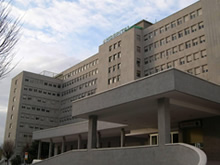Granada
In 2001, a recruitment of pregnant women for a cohort was started in the Clinical Hospital of Granada and the Hospital of the West of Almeria, with the intention to study the relevance of malformations in the masculine genitourinary tract in new born children.
The objective was to try to demonstrate that there is a relation between the chronic exposure of the mother to environmental chemical compounds with hormonal activity, “endocrine disruptors” and the frequency of cryptorchidism and hypospadias in the descendants.
That is why approximately 700 women who had given birth to male children were recruited, 50 of them where indexed with cryptorchidism and/or hypospadias. In a parallel way, a case-control study was begun with 150 new born children with intervention in the diet during the pregnancy (supplement of folic acid to the mothers).
The cohort of mother and children is providing very useful information on the maternal-infantile exposure to chemical compounds with hormonal activity. The studies that already have begun have been useful to show the existing importance of the maternal exposure and regional differences with other European countries. The additional use of exposure markers is being a key issue in the characterisation of the interactions between chemical compounds and the resulting hormonal effect.
-
Collaborating Entities:
- Consentimiento informado, Granada
- Visita 9-10a GRA, Cuestionario de frecuencia alimentaria y actividad física
- Visita 4-5a GRA, Consentimiento informado, Granada 4-5 años
- Visita 4-5a GRA, Cuestionario ambiental niño, Granada 4 años
- Visita 4-5a GRA, Cuestionario de frecuencia alimentaria y actividad física
- Visita 4-5a GRA, Cuestionario general, Menorca 4 años
- Visita 4-5a GRA, Formulario diferenciación sexual al año de edad, Granada 4-5 años
- Visita 4-5a GRA, Cuestionario de salud mental, Granada 4-5 años
- Visita 4-5a GRA, Escala sobre vínculo afectivo adaptación para niños, Granada 4 años
- Visita 4-5a GRA, Antropometría, Granada 4-5 años
- Visita 4-5a GRA, Cuestionario general, Granada 4-5 años
- Visita 4-5a GRA, Salud Mental, Granada 4-5 años
- Visita 4-5a GRA, Vínculo Afectivo, Granada 4-5 años
- Visita 4-5a GRA, Ambiental, Granada 4-5 años
- Visita 4-5a GRA, Antropometría, Granada 4 años
- Visita Nacimiento GRA, Cuestionario salud reproductiva y dieta
- Visita Embarazo GRA, Consumo de agua embarazo, Granada
- Visita Embarazo GRA, Cuestionario salud reproductiva y dieta




